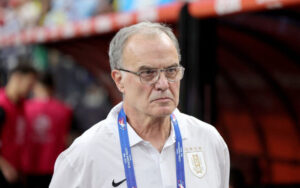
The Uruguay team coached by Marcelo Bielsa earned rave reviews during the group stage of the Copa America, scoring nine goals while seeing off Panama, Bolivia and the USA. The knockout stage, however, was a different story, with Uruguay unable to find the net against either Brazil or Colombia. A disappointing Brazil team were seen off on penalties, despite Uruguay going a man down in the 74th minute, but try as they might, they could find no way past 10-man Colombia in the second half of the semi-final in Charlotte.
Afterwards, Bielsa minced no words, blaming himself for the team’s exit. “I am personally liable for not achieving the result, despite having these players that were capable of being superior than the opponent,” he said.“We were not able to seize our extra-man advantage, and when a team wins with less individual talent, logically, the manager that is coaching the weaker team shows that he is superior than the coach that had the best players.”
But while that statement stood out, it was nothing next to his long lecture about his fears for football’s future. Speaking before the Brazil game, he took potshots at the bean-counters who see only the bottom line and not the main reasons why people love football in the first place.
“Football has more and more spectators but is becoming less and less attractive,” he said. “What made this game the best game in the world at the time is not prioritised today. “No matter how many people watch football, if you don’t ensure that what people watch is something pleasant, it will only benefit the business. Because the business only cares about how many people watch it.
For the Latest Sports News: Click Here

“But in a few years, the players who deserve to be watched will be less, and the game produced becomes less enjoyable, this current artificial increase in spectators will end.”
There was a warning, too, about sport’s obsession with social media and ‘reels’, as opposed to the focus being on paying spectators and the hardcore fan who treks to dozens of matches each year. “Football is not just the five minutes of highlights,” he said. “Football is much more than that, it is a cultural expression, it is a way of identification.”
In an age of multi-billion-dollar TV deals and tickets more expensive than the average monthly salary in many countries, Bielsa’s worry was that the genuine fans would be squeezed out of stadiums. “In its essence, football is a popular property,” he said. “Why? Because poor people have very limited access to buy what makes them happy, because they do not have the money.So, football being free, it is one of the few things that the poorest people can have. However, today, they no longer have it.”
Brazilian football’s latest prodigy, Endrick, will make his way to Madrid later this month. He turns 18 on July 21, but the deal to take him across the Atlantic was inked over 18 months ago. It’s a state of affairs that dismays Bielsa, who fears that more and more South American talent will rot on European benches instead of racking up valuable experience at home.
Bielsa referenced the Sao Paulo team that beat his Newell’s Old Boys on penalties in the Copa Libertadores final of 1992. “Do you remember the formation of São Paulo?” he asked reporters.“With a monumental coach [Tele Santana, who was in charge of Brazil at the 1982 and ’86 World Cups] and a formation of all Brazilian national team players, all playing in local football.

“Look at what happened to poor South American football. Raí, Antonio Carlos, Ronaldo, Cafú, Pintado, Muller played there, all ‘European’ players, but before going to Europe, they played in two Copa Libertadores finals.”
Of those name-checked by Bielsa, Rai moved to Paris Saint-Germain at 28, and enjoyed five successful seasons there. Cafu was 27 when he went to Serie A, playing for Roma and AC Milan and winning the league with both. Even Neymar, who moved to Barcelona at 21, had played more than 200 games for Santos by the time he made the leap.
“What a shame that I have to say something today that will only bring me criticism,” added Bielsa, referring to the fat pay cheques that the big European clubs routinely flash at South America’s brightest young talents.
His words may have all the impact of a paper napkin in the monsoon rain, but anyone that loves the beautiful game and recognises that it’s so much more than a ‘product’ to be marketed would do well to listen closely.
Also Read: Anwar Ali’s Transfer to East Bengal: Debunking the Speculation